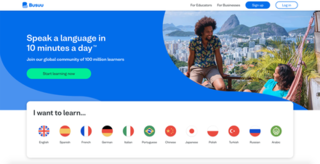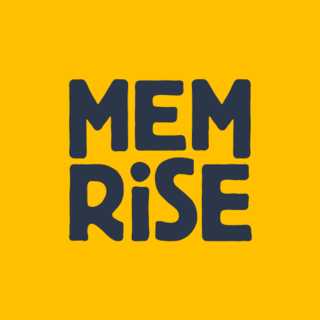
Open educational resources (OER) are teaching, learning, and research materials intentionally created and licensed to be free for the end user to own, share, and in most cases, modify. The term "OER" describes publicly accessible materials and resources for any user to use, re-mix, improve, and redistribute under some licenses. These are designed to reduce accessibility barriers by implementing best practices in teaching and to be adapted for local unique contexts.

Rosetta Stone Language Learning is proprietary, computer-assisted language learning (CALL) software published by Rosetta Stone Inc, part of the IXL Learning family of products. The software uses images, text, and sound to teach words and grammar by spaced repetition, without translation. Rosetta Stone calls its approach Dynamic Immersion.

An electronic dictionary is a dictionary whose data exists in digital form and can be accessed through a number of different media. Electronic dictionaries can be found in several forms, including software installed on tablet or desktop computers, mobile apps, web applications, and as a built-in function of E-readers. They may be free or require payment.

Google Translate is a multilingual neural machine translation service developed by Google to translate text, documents and websites from one language into another. It offers a website interface, a mobile app for Android and iOS, as well as an API that helps developers build browser extensions and software applications. As of 2022, Google Translate supports 133 languages at various levels. It claimed over 500 million total users as of April 2016, with more than 100 billion words translated daily, after the company stated in May 2013 that it served over 200 million people daily.

Wiradjuri is a Pama–Nyungan language of the Wiradhuric subgroup. It is the traditional language of the Wiradjuri people, an Aboriginal Australian people of New South Wales, Australia. Wiraiari and Jeithi may have been dialects.
The Gitxsan language, or Gitxsanimaax, is an endangered Tsimshianic language of northwestern British Columbia, closely related to the neighboring Nisga’a language. The two groups are, however, politically separate and prefer to refer to Gitxsan and Nisga'a as distinct languages. According to the Report on the status of B.C First Nations Languages there are 523 fluent speakers, 639 that understand or somewhat speak and 344 learning speakers.
Livemocha was an online language learning community based in Seattle, Washington. It provided instructional materials in 38 languages and a platform for speakers to interact with and help each other learn new languages. According to the site, it had approximately 12 million registered members from 196 countries around the globe. It was free to join and use; however, it offered the option to pay for various benefits. In 2012, 400,000 users visited the site daily.
Babbel GmbH, operating as Babbel, is a German subscription-based language learning software and e-learning platform, available in various languages since January 2008.

Busuu is a language learning platform on web, iOS and Android that allows users to interact with native speakers. In 2021, Chegg acquired Busuu for $436 million.

Memrise is a British language platform that uses spaced repetition of flashcards to increase the rate of learning. It is based in London, UK.
AppSumo is a daily deals website for digitally distributed goods and online services. AppSumo was founded in March 2010 by serial online entrepreneur Noah Kagan.

Pimsleur Language Programs is an American language learning company that develops and publishes courses based on the Pimsleur method. It is a division of Simon & Schuster, a publishing company which is a subsidiary of Kohlberg Kravis Roberts. Pimsleur offers courses for 50 languages with English as the source language, and 14 ESL courses.

Duolingo, Inc. is an American educational technology company that produces learning apps and provides language certification. Duolingo offers courses on music, math, and 43 languages, ranging from English, French, and Spanish to less commonly studied languages such as Welsh and Irish. Other services include the Duolingo English Test, an online certification program, and Duolingo ABC, a literacy app for children. The company uses a freemium model, with its optional premium service, Super Duolingo, being ad-free and offering more features.
Learning Ally, previously named Recording for the Blind & Dyslexic (RFB&D), is a non-profit volunteer organization operating nationwide in the United States. It produces and maintains a library of educational accessible audiobooks for people who cannot effectively read standard print because of visual impairment, dyslexia, or other disabilities.

Codecademy is an American online interactive platform that offers free coding classes in 12 different programming languages including Python, Java, Go, JavaScript, Ruby, SQL, C++, C#, and Swift, as well as markup languages HTML and CSS. The site also offers a paid "Pro" option that gives users access to personalized learning plans, quizzes, and realistic projects.
Voxy is an American eLearning company and English learning platform. The company was founded in February 2010 by Gregg Carey and Paul Gollash and is headquartered in New York City along with an office in São Paulo, Brazil.
Rocket Languages Ltd is an online language learning company founded in 2004 by Jason Oxenham and Mark Ling.

Otter.ai, Inc. is a Mountain View, California-based technology company that develops speech to text transcription applications using artificial intelligence and machine learning. Its software, called Otter, shows captions for live speakers, and generates written transcriptions of speech.

Xeropan is a gamified language learning application built by English-language teachers.












